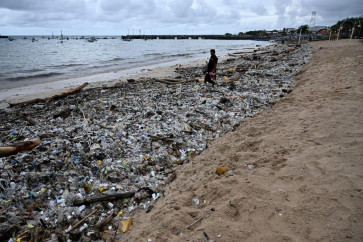Base in Belawan to fight smuggling in North Sumatra
Onion runner: A boat is pictured after being caught smuggling tons of onions from Malaysia, in Tambun Tulang Asahan waters, North Sumatra, on Thursday
Change text size
Gift Premium Articles
to Anyone

O
span class="caption">Onion runner: A boat is pictured after being caught smuggling tons of onions from Malaysia, in Tambun Tulang Asahan waters, North Sumatra, on Thursday.(JP/Apriadi Gunawan)
The North Sumatra branch of the Customs and Excise Directorate General (DJBC) will establish an operational base at Belawan Port in Medan to curb smuggling from the Malacca Strait into the province.
Ports on the province’s western coast have become popular entrance points for smugglers bringing in contraband such as narcotics and used clothing from Malaysia.
DJBC branch head Iyan Rubiyanto said the base would come with sophisticated radar devices to monitor smuggling activities in the Malacca Strait.
He said the base would be developed this year and the radar would follow later.
Iyan also said a number of large-sized patrol ships would be stationed at the Belawan base once it was established.
“We need the new base to deal with the massive smuggling activities from Malaysia,” Iyan told The Jakarta Post after conducting a press briefing at his office on Thursday.
He said the base would cover North Sumatra and Aceh.
So far, four similar such bases have been established, namely Tanjung Balai Karimun in Batam, Tanjung Priok in North Jakarta, Pantonloan in Makassar and Sorong in Papua. He said more bases were needed, including the one to be built in Belawan.
North Sumatra, according to Iyan, is prone to smuggling activities as the strait connects its waters with Malaysia, Singapore and Thailand.
He said the number of smuggling cases nabbed by his office had continued to increase. In 2015, for example, there were 327 cases of smuggling. The figure increased into 618 in 2016.
“This proves that smuggling is still rampant in North Sumatra,” he said.
Of the cases in 2016, he added, 500 involved the smuggling of narcotics, used clothes, onions and other goods such as sex toys, contraception, cosmetics, spare parts and medicines.
Eight other cases involved the smuggling of wooden chairs, feeder cables, frozen frogs and live crabs.
Another 106 cases involved tobacco products and alcoholic beverages.
Iyan said the challenges ahead in 2017 would be tougher than in previous years, but expressed optimism that his office would be able to deal with them.
Rizal, the head of the office’s surveillance and action division, said that almost every day a smuggling ship was nabbed by his officers.
“Today they nabbed a ship with no name in Tambun Tulang waters, Asahan, that attempted to smuggle in 40 tons of onions from Malaysia,” Rizal said.
Fuad Fauzi, the head of the Teluknibung customs and excise office in Tanjungbalai, said Tanjungbalai was known to be a nest of contraband.
Smuggling had been going on for a very long time, he added. He said it was difficult to curb the smuggling because it fed into the local economy in the poor port cities along the coast.
Fuad said many unemployed people from Tanjungbalai helped the smugglers escort smuggling ships coming in from Malaysia.
It was always these people that the patrol officers had to deal with in the field, he added.
“They are paid Rp 100,000 (US$7.5) per person to do the job,” said Fuad, adding that many anti-smuggling officers had been wounded after being attacked by these paid smugglers while attempting to press down on the illegal activity.









